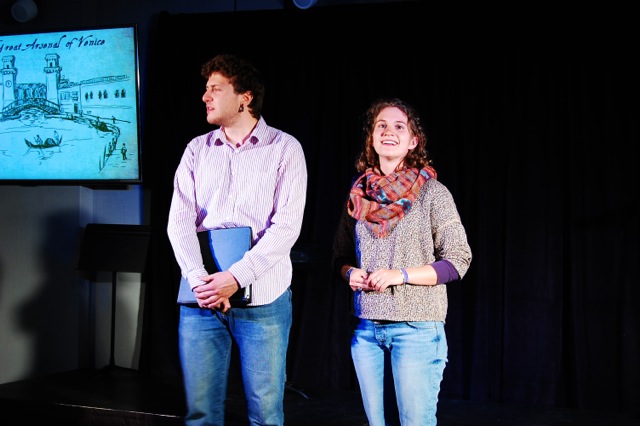“Truth is born of the times, not of authority!” Such is the spirit evoked by Rush Rehm’s staged reading of Bertolt Brecht’s “The Life of Galileo,” which proved this past weekend to be one of the most critically engaging shows put on by Stanford’s TAPS department this season. Part of Stanford’s Imagining the Universe series, “Galileo” pushes us to interrogate the intersection of truth and reason in our own lives – as well as the type of questions we should be asking as academics on this campus.
The story chronicles the life of Galileo as he challenges the doctrine of religion with his newly developed theory of heliocentrism (the idea that the earth revolves around the sun), and takes us on a journey of exploration into not only the nature of the cosmos, but also of our own responsibility to future generations. Faced with charges of heresy, Galileo is eventually forced to renounce his astronomical discoveries – and in doing so, transform from a fearless idealist into a washed-up academic too cowardly to prevent science from taking this same course.
From the onset, it is clear that “The Life of Galileo” is far from traditional. The setting of the show itself — the conspicuously high-tech environment of Lathrop 282 — makes it difficult to ignore the connections between the academic themes in the script and academia here at Stanford. Surrounded on all sides by nine massive screens projecting maps, scene titles, and even various sketches (designed by Jessi Piggott and Alex Scott ‘16), audience members are virtually incapable of distancing themselves from the ever-looming influence of scientific development on our own realities.
In the house, actors are seated in rows of chairs at each end of the stage, where the audience can easily see them change costumes and slip in and out of character – no doubt to the surprise of many onlookers. As the play unfolds, a clear discrepancy is maintained between actors onstage and the characters they set out to portray. The use of gesture by each performer to caricaturize their roles is exceptionally successful – particularly by Galileo’s pupil Andrea (Alex Cheng ‘17) and the Grand Inquisitor of the Catholic Church (Matthew Smith, TAPS Professor) – and helps bring to life the sense of absurdity so vital to the production. Alex Johnson, who plays Galileo, beautifully depicts a character who is anything but the flawless tragic hero we are at risk of expecting. Throughout the show, enchanting a cappella ballads (performed by the talented soprano Shu Chen Ong ‘17) and a lively carnival scene (led by the outstanding Paul Rosenfield ‘12), ensure that our attention never wavers.
These techniques are, in many ways, products of Brecht’s theory of alienation: the idea that an audience must be separated from the emotional impact of a play in order to politically engage with it. Without this emotional distancing, “Galileo” is easy to misconstrue entirely – especially here in the lavish, self-congratulating environment of Silicon Valley, where science is lauded as the irrefutable solution to issues of change and social progress. Though the play itself is highly critical of Galileo’s doctrine of science, it is easy to overlook these complexities in favor of a much simpler narrative: one in which Galileo valiantly defends reason in the face of burdensome tradition. Yet it is our skepticism of Galileo’s “hero-like” role which is most important; it is what allows us to become more critical of authority figures in every field – including the sciences. Given the importance of this message in our current place in history, an even stronger emphasis on these alienating theatrical devices might have helped ground “The Life of Galileo” more firmly in the realities of its viewers, and more effectively eradicate any remaining perceptions of this production as a new iteration of the Stanford success story.
But overall, Rehm’s work is moving in a way which supplements, rather than hinders, political engagement. “Unhappy is the land that needs a hero,” Galileo tells us as the play comes to a close, before he is condemned to a life of shame and solitude – reminding us that the fates of science and religion aren’t as different as we may imagine: that, in fact, science without an emphasis on the truth will lead to nothing but new injustice. At an institution where we often find ourselves paralyzed in the face of our own structural power, such a reminder is not only important – it is essential. Without cultivating a willingness to engage in art which criticizes our own commitment to truth, both theater and academia will continue to perpetuate the very lies we have sworn to fight. Now, as we move forward, we must ask ourselves: which role do we want to play in our own historical narratives: the onlooker or the actor?
Contact Madelaine Bixler at mbixler ‘at’ stanford.edu.
